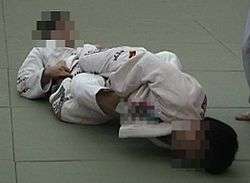Ashi-Hishigi
| Ashi-Hishigi | |
|---|---|
|
Judoka demonstrate Ashi-Hishigi/Achilles lock | |
| Classification | Katema-waza |
| Sub classification | Kansetsu-waza |
| Kodokan | No |
| Technique name | |
| Rōmaji | Ashi-hishigi |
| Japanese | 足挫 |
| English | Achilles ankle lock |
Ashi-Hishigi also called an Achilles lock or simply an ankle lock, is a technique described in both The Canon Of Judo[1] by Kyuzo Mifune and Brazilian Jiu-Jitsu, Theory and Technique[2] by Renzo Gracie and Royler Gracie as well as demonstrated in the video, The Essence Of Judo. It is classified as a joint lock (Kansetsu-waza), and is not a recognized technique of the Kodokan. However, It is a commonly used technique in both Brazilian Jiu-Jitsu tournaments and Mixed martial arts competition.
Technique Description
Executing this lock involves pressing the achilles tendon into the back of the ankle or lower leg. It is typically performed by wedging a forearm, especially a bony part of it, into the Achilles tendon. Simultaneously leveraging the foot and the leg over the forearm, which serves as a fulcrum. This causes severe pressure on the Achilles tendon, often resulting in an ankle lock, since the ankle is being used as a point of leverage. Similarly, some ankle locks also cause a compression lock on the Achilles tendon, and hence the term "Achilles lock" is often also used to describe such ankle locks.
Included Systems
Lists:
Similar Techniques, Variants, and Aliases
Aliases:
- Leglock
- Achilles ankle lock
References
- ↑ Mifune, Kyuzo (2004,1965,1960). The Canon Of Judo. Kodansha International Ltd. pp. 156,157. ISBN 4-7700-2979-9. Check date values in:
|date=(help) - ↑ Gracie, Renzo and Royler (2001). Brazilian Jiu-Jitsu, Theory and Technique. Invisible Cities Press. p. 146. ISBN 1-931229-08-2.
